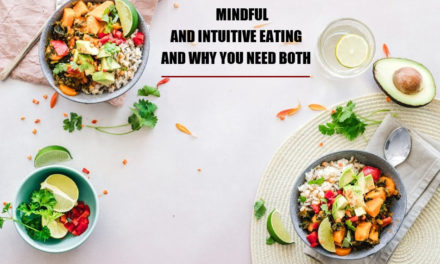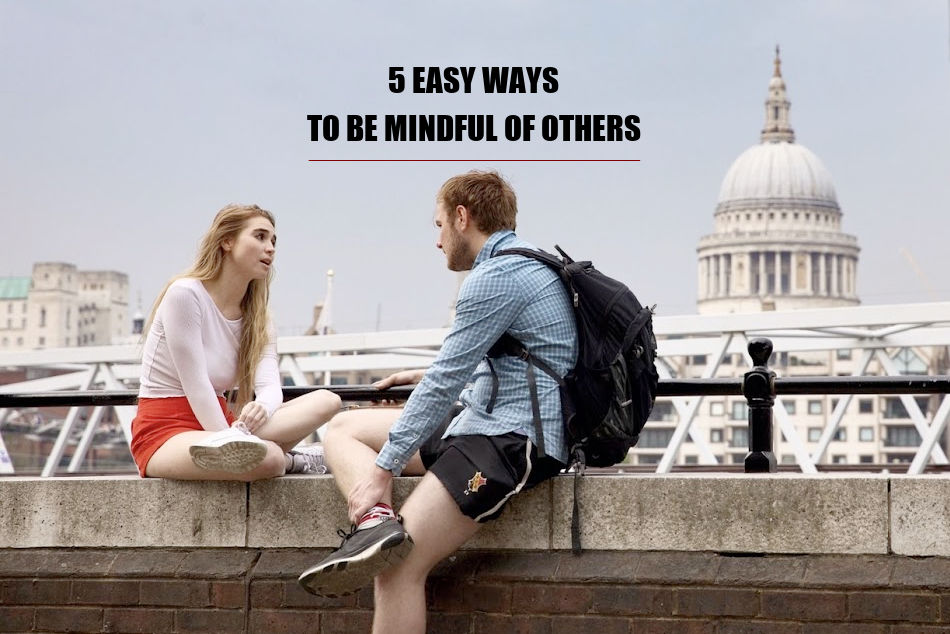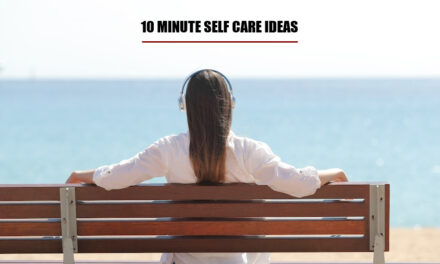In this post: How can you be mindful of others? We’re often consumed by self-interest and distractions these days. But it’s crucial to pause, take a breath, and open your heart to the needs and emotions, especially of those around you.
The office was brimming with activity. To say that it was shaping up to be a challenging week is an understatement. I sat at my desk engrossed in my work. As the deadlines loomed and the pressure mounted, I noticed my colleague across the room, visibly overwhelmed and struggling to keep up.
I took a pause from my own tasks for a moment and approached her with a genuine smile, offering a supportive presence. I gently asked “How are you managing, is there anything I can do to help?”
She opened up about the mounting workload and the sense of overwhelm that has been building up.
I offered some practical suggestions to alleviate the workload, shared strategies for managing the stress, and even recommended resources that could be of assistance.
Are you considerate of other people? Mindfulness on a whole usually targets you as an individual. To be mindful of others calls for you to be less critical of other people and to show kindness.
This approach requires that you be self-aware and that you bring your focus to the present moment. It requires you to accept and be more tolerant of people in every respect, their strengths, as well as their shortcomings.
Table of Contents
What It Means To Be Mindful

Mindfulness is an expression that is constantly tossed around these days. You and I are both saddled with the stress that comes from all the demands in our lives daily.
For instance, you’re always ‘busy’ checking out social media, your messages, or checking the next email every few minutes.
But how do you really define mindfulness? To be mindful means to target your focus intentionally. It sometimes involves you paying attention to what you’re thinking as well as your emotions in an objective way, meaning, you appreciate it for what it is while being non-judgemental.
It can also mean purely being more present in the present moment and focusing on your breathing. You’re attentive to every moment and are totally absorbed in your surroundings.
You aren’t thinking about or reflecting or looking at the past or the future, or allowing worry and fear or your overall feeling to creep into your mind. This approach can really help to strengthen your mental health.
You’ll start by really focusing on your senses and thoughts during your activities, and over time, this will become a natural part of your life.
It will help to bring calm and to help stop the round-the-clock conversation in your mind. Doing this helps you to slow down, appreciate and enjoy life even more.
Why Is It Important To Be Mindful?
Wondering why it’s important to be mindful? Well, practicing mindfulness helps you to get a better handle on your emotions. It can also help you to pay attention to the way you think as well as how you feel without judging or criticism.
When you’re more present in your own life coupled with your interactions in your relationships, it can play a big role in helping you with mindfulness.
This will set you up to take action and make the right choice as to how and when to express the emotions you feel and be totally involved and enjoy your life’s experiences.
With so much stress in life, mindfulness is an excellent ‘tonic’ for stress, as it does help to reduce anxiety and stress. This, in turn, can improve your overall health and contentment which enables you to be involved in a happier fulfilled life.
How Do You Become A Mindful Person

First off, if you want to be mindful of others you have to be mindful as an individual. We all have our own mental attitude which is affected by countless different things.
When you live mindfully, you choose to develop a particular form of awareness in your mind with tons of optimism, with the attitude to match as well as toleration.
The thing is, when practicing to live mindfully, it’s critical that you take note of your deepest thoughts and feelings with no judgments at all. That way, you can go about getting a better handle yourself as well as others with greater sensitivity, appreciation, and consideration.
Sometimes it may be difficult for you to flip negative thoughts and attitudes to positive ones but when you’re being mindful you have to get to a place of tolerance.
Simple Habits For Daily Mindfulness

Here are some ways to help you thrive in developing mindfulness habits. These includes:
- Notice Your Breathing – This doesn’t have to take a lot of time. Just take a few minutes out of your day to take a few moments quietly and notice your breath. It can help you to be more aware and intentional throughout your day.
- Ditch Multitasking – Studies have shown that tasks take much longer to be completed when multitasking. The fact of the matter is that you’re prone to make more errors by at least fifty percent (50%) rather than when you take on tasks one at a time. It’s also important to take a breather when you can.
- Take It Slow – Appreciate the experience. Whatever that activity is, whether it’s renovating your kitchen, cooking a meal, or even drinking a cup of coffee or tea, take it slow. Paying attention to your activities every day can help to keep you focused and helps to prevent stress and overwhelm.
- Mindful Eating – One of the best ways to start a mindful lifestyle is to be a mindful eater. Eating without distractions and focusing on your food helps you to tap into your different senses when you eat slower and chewing more for each bite helps you to enjoy and appreciate your food even more.
Related: Mindful And Intuitive Eating
- Take A Break From Technology – with all the technology readily available to you and with so many things revolving around it, it can be hard to tear yourself away from it, but you must. It can be easy to get overwhelmed. Put limits on the amount of time you spend on your computers and set aside time for yourself.
- Exercise – Be conscious of the miracle that is your body. It’s essential that you exercise your body and walking is one of the easiest ways to start. You can then incorporate other forms of exercise like strength training, as you get more into it. Related:
Related: The Short And Long Term Benefits Of Exercise
- Get Out In Nature– Being out in nature does a world of good for your mind body and soul. Whether you’re at the park, taking a hike, spending some time at the beach, soaking up some sun are all great ways you can practice mindfulness. These are some activities that can help you to be more focused on your surroundings and therefore help you to be more present.
- Write In Your Journal– Journaling will help you to look within yourself and have a necessary heart-to-heart with yourself. This helps you to bring your concerns to the fore instead of ignoring them or keep putting them on the back burner. This also helps to confront your emotions connected to these concerns directly.
- Listen To Soothing Music – With things being so unstable these days we’re all exploring ways to help handle our concerns, emotions, our attitudes, and the way we approach life. Music can help to lift your spirit during stressful times as well as keep you in the present.
How To Be Mindful Of Others
1. Consider The Feelings Of Others

Being considerate to the feelings of others is all about being respectful and using tact. It also involves being thoughtful and compassionate of other people’s feelings. After all, if the shoe was on the other foot you would want that kind of treatment right?
It could be as simple as asking someone how was your day? And really mean it, not asking just to strike up a conversation, but really being caring and attentive as the person relays the details of what took place throughout their day.
When you’re considerate of others it makes them feel valued and like you’re really concerned.
We as human beings love being treated with thoughtfulness. And it warms your heart with compassion and empathy when you reach out, it’s a total win-win situation all around.
2. Be Attentive

When you interact with others, show them respect by giving them your undivided attention. Put a pause on whatever you’re doing, and that includes your gadgets. it’s even better if you put your gadgets on silent so that there will be no distractions.
This will allow you to listen closely so that you can really understand, without any judgments to the point they are trying to get across to you.
Hold eye contact (of course not in a creepy way) without interrupting them, or rushing to interfere and form your own opinion. Look at their body language and gestures and when asked respond in a meaningful way.
3. Be Involved In Your Relationships

Every relationship has its speed bumps. So they require that you put in the effort if you want them to be successful whether they are romantic or platonic relationships.
Good communication is the key ingredient in any relationship. It’s important that you figure out how to communicate effectively with your loved one.
Knowing how to relate and express yourself openly and honestly helps to build solid relationships. You have to feel comfortable to speak about things that get on your last nerve without being disrespectful or fearful.
When building your relationships, show that you care and that you’re committed. Another important factor is respecting boundaries. Don’t cross the line, that doesn’t go over well at all in any relationship.
Don’t forget to show your appreciation it helps to form strong bonds and trust.
4. Give Back

Volunteering is a great way to pitch in and give back. It not only helps your community but also makes you feel more fulfilled.
Helping others not only helps you to show compassion and so impact the lives of others but also helps you to create strong connections.
When you’re more engaged in helping other people, the focus is placed on them which calls for you to be completely present in those moments.
Giving back in your community or even on a wider scale, outside of your community is a great way to help you to refocus and become more mindful of others. This can help to make meaningful contributions and help you to recognize and grasp the true meaning of life.
5. Take A Trip

Taking a trip almost always brings on s feeling of excitement. You look forward with great anticipation to experience a new environment, culture, and people.
Travelling also helps you to slow down and shut out the noise of your regular day-to-day life.
You”ll be in a different environment and so it gives you a chance to be fully present with what you’re doing and what’s happening around you.
You’ll get to experience and immerse yourself in a different culture. This gives you a chance to engage and learn from the people you come in contact with and make connections with these people and eventually form a bond.
Being Mindful Of Others In The Workplace

Now that you have an understanding of what mindfulness is, let’s see how it applies in the workplace.
Being mindful of others in the workplace is not only important for creating a positive and harmonious work environment, but it also benefits you personally and professionally.
There are numerous benefits for both individuals and the overall work environment. It can:
- Improve communication.
- Foster empathy.
- Promote a more positive and inclusive workplace culture.
- Help reduce conflicts.
- Improve teamwork and productivity.
- Help you manage stress better.
- Lead to improved mental health and overall well-being.
- Create a more fulfilling work experience for everyone involved.
How To Be Mindful Of Others In The Workplace

Let’s take a look at some practical ways to cultivate mindfulness in your daily interactions with colleagues.
- Practicing active listening is key. This means giving your full attention to whoever is speaking without interrupting or judging their words.
- Try to be empathetic and considerate of others’ perspectives, even if you may not agree with them.
- Practicing gratitude and showing appreciation for your colleagues can also promote a positive and supportive work environment.
- Make an effort to manage your own emotions and reactions in challenging situations, as this can greatly impact the overall workplace atmosphere.
- And finally, don’t forget to take breaks and prioritize self-care to avoid burnout and maintain a healthy work-life balance.
Conclusion On Be Mindful Of Others
All habits, no matter what they are, start with routines. You decide what you want to change in your life and add it to your daily routine. Mindfulness is a good tool that can be used in a number of different ways.
In almost every case though, the ultimate purpose is to be aware of the present moment and to find an inner peace that escapes you, especially in these uncertain times.
When you practice mindfulness as an individual it spills over into being mindful of others. And to be mindful of others you have to take the feelings of others into consideration while being respectful.
It’s about being tolerant, kind and objective without casting judgment. The more you practice, the easier it becomes.
Are you being mindful of others? Comment below!
























good read and informative! I try to practice mindfulness and writing my tasks to do and schedules so I dont crash it
I absolutely love how you chose to speak on this topic – mindfulness is seriously such a big factor in helping in relationships and in our day-to-day lives! I love the tip of taking a trip, truly the more we experience, the more we learn x thank you for sharing!